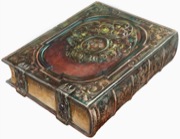 Matthew Morris
RPG Superstar 2009 Top 32, 2010 Top 8
Matthew Morris
RPG Superstar 2009 Top 32, 2010 Top 8
|
More, more more please.
KAM's succeeded in making Galt that much more 'alive' to me, as well as how to see an Alchemist.
Wild Cards reference, now I wish I had Legion's power (Or Jamie Maddrox's) so I could play all the concepts in my mind.
Edit:
This
 Courtney!
Courtney!
|
Yay! You were right, this installment has MUCH more alchemical badassery! :) The battle was exciting, but I like how overall, the story plays out less like an action/RPG and more like a point-and-click computer adventure/exploration game, solving puzzles and finding secret compartments and whatnot, with a hearty dash of Girl Genius for flavor. (Side note: that illustration of the book is beautiful! I want a copy irl.)
I like that your world history has done nothing to glorify warfare, though of course the training has come in handy for Norret, and I like that you have written a wounded vet largely abandoned by the world that is nevertheless far from helpless. I worry about him, though, going off on his own all the time; if he got hurt or trapped somewhere, how long would it be before someone realized he was missing, and how would they ever find him in time? I'm also worried about him emotionally; he was yanked away from childhood and thrust into the atrocities of war, his entire support network is long gone...are we seeing the march of a brave Stoic Woobie, or is he gonna snap and murderize everyone some day? (Must...not...write terrible fanfiction wherein a spunky girl sidekick teaches him how to love and laugh again. How long can I resist this baleful urge!?)
I've been looking forward to this installment all week, and it was read and re-read all too quickly. Next Wednesday can't come soon enough!
 King of Vrock
King of Vrock
|
Each install ment better than the last. As Norret was solving the Duke's Mansion sized puzzle I couldn't help but think that Norret was Golarions version of Robert Langdon. I also see a lot of Robert Carlysle's protrayal of the apothecary Will Plunkett (Plunkett & Macleane) in him.
--Vrocket Science
| Jason Lillis |
Jason Lillis wrote:Can Norret be the new iconic for Alchemists? Or can he at least share duties with Damiel?Damiel says no...
And if Damiel says no, you don't want to make him angry!
Actually it brings up a question: Could we see web fiction for iconics? They have really solidly described histories, and we get to assume they are up to all sorts of no good in the pictures and text at the start of core rulebook chapters, but hearing about some of their other adventures would also be cool.
Sorry to side trek: KAM: Great Stuff!
| James Sutter Contributor |
Right now Norret >>> than Damiel.
Norret, "The essense of Onyx, will amplify the nightshade's essense to draw the positive energy from the target..."
Damiel, "I'm going to throw a bomb."
And that's why Damiel's the iconic. He don't waste time lecturing when someone's in need of a bombin'!
| Kevin Andrew Murphy Contributor |
Matthew Morris wrote:And that's why Damiel's the iconic. He don't waste time lecturing when someone's in need of a bombin'!Right now Norret >>> than Damiel.
Norret, "The essense of Onyx, will amplify the nightshade's essense to draw the positive energy from the target..."
Damiel, "I'm going to throw a bomb."
Oh, neither does Norret. It's all lightning-fast internal monologue calculations, with the lectures after-the-fact when someone asks him to explain how he did what he did.
You realize, of course, we're talking the relative merits of badass Sherlock Holmes as played by Robert Downey Jr. in the last movie vs. Dr. Henry Jekyll/Mr. Hyde from League of Extraordinary Gentlemen, right?





